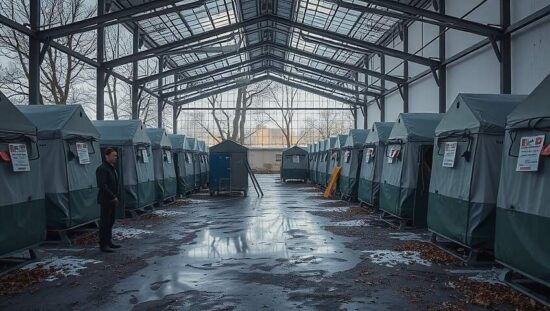Berlin’s Largest Refugee Shelter Under Fire for Operating Conditions and Contracts
A recent investigation by RTL and Stern has raised concerns that the operating contracts and organizational structure of the largest refugee shelter in Germany, located on the former Berlin-Tegel Airport, may be contributing to suboptimal conditions. The shelter, which has been criticized for its state, costs the state of Berlin and by extension, taxpayers, around 428 million euros annually, according to the investigation.
The legal foundation for the shelter’s operation is a contract between the Berlin State Office for Refugee Affairs (LAF) and the Berlin Exhibition Grounds (Messe Berlin). This contract stipulates that Messe Berlin is entitled to a 15% administration surcharge on all expenses for the shelter, as is the German Red Cross (DRK), which serves as the general operator of the shelter. The DRK, however, declined to disclose the exact amount of this surcharge.
The suspicion is that the operators may be incentivized to increase their profits by incurring as many expenses as possible. Despite a continuous decline in the number of refugees being housed, the deployment of care personnel appears to be enormous. Notably, the contracts show vastly different high sums being paid, such as the post of leadership, management and administration to the DRK, with around one million euros being transferred to the DRK per month in 2022.
Furthermore, the shelter’s personnel deployment remains high, with around 1,400 men and women expected to work in the shelter daily in 2023. A covert reporter, who worked in the shelter for weeks disguised as a volunteer, observed on multiple occasions that staff members were idle during working hours, reading books, playing video games and engaging in similar activities, as reported by RTL and Stern, because they had nothing to do, as they claimed.
The Berlin State Office for Refugee Affairs acknowledged the situation in Tegel is unsatisfactory, stating that the shelter’s operation does not conform to the usual practices of the office. The Senate and the office also consider the ongoing costs to be too high. The Senate is aware that the emergency shelter in Tegel is not only expensive but also not suitable for helping refugees integrate into the city. Despite this, the shelter is necessary to prevent homelessness among refugees.
The Arbeiter-Samariter-Bund (ASB) responded that the personnel deployment is flexible, taking into account the shelter’s occupancy, shift times and security measures, primarily in the context of evacuation and emergency plans.
The German Red Cross denied any profit-motivated interests, stating that the DRK Social Work operates on behalf of the state of Berlin and only accounts for the actual services provided. Any surpluses are either returned or offset. The DRK referred the inquiry to the state office.
The state office, in turn, pointed out the high numbers of refugees and the need for external services to be quickly deployed. It also referred to the long-term plans for the shelter, which are expected to remain in operation for at least five more years, serving as an arrival center for all asylum seekers arriving in Berlin.





